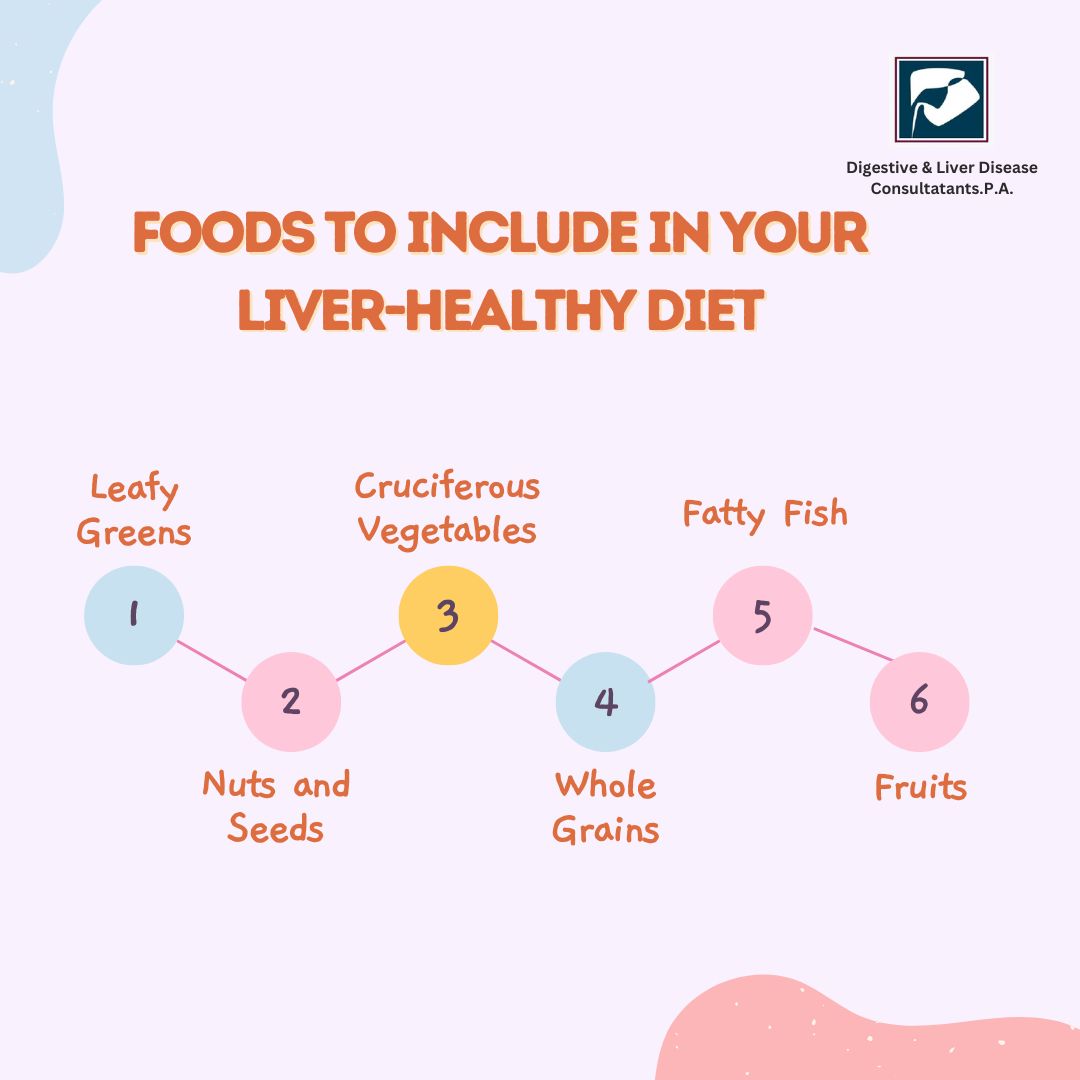Your liver is one of the most vital organs in your body, working tirelessly to filter toxins, process nutrients, and support digestion. Keeping your liver healthy is essential for overall well-being, and one of the best ways to do that is through a balanced, liver-friendly diet. Whether you’re looking to prevent liver issues or manage an existing condition, a liver-healthy meal plan can make a world of difference. In this blog, we’ll guide you through simple steps to create a meal plan that supports liver health, and we’ll also highlight how Digestive & Liver Disease Consultants, P.A. can help you on your journey to better liver health.
Why Liver Health Matters
The liver plays a crucial role in detoxifying your body, producing bile for digestion, and storing essential nutrients. However, poor dietary choices, excessive alcohol consumption, and certain medical conditions can harm your liver, leading to issues like fatty liver disease, hepatitis, or cirrhosis. The good news? A healthy diet can help protect and even repair your liver.
Key Principles of a Liver-Healthy Diet
Before diving into meal ideas, let’s cover the basics of what makes a diet liver-friendly:
Limit Processed Foods: Processed foods are often high in unhealthy fats, sugar, and additives that can strain your liver. Opt for whole, natural foods instead.
Choose Healthy Fats: Not all fats are bad! Focus on unsaturated fats like those found in olive oil, avocados, and nuts, which support liver function.
Increase Fiber Intake: Fiber helps your liver work efficiently by aiding digestion and reducing cholesterol. Fruits, vegetables, and whole grains are excellent sources.
Stay Hydrated: Water helps flush toxins from your body, easing the liver’s workload.
Moderate Protein Intake: While protein is essential, too much can be hard on the liver. Choose lean proteins like fish, chicken, and plant-based options.
Avoid Excess Sugar and Salt: High sugar intake can lead to fatty liver disease, while too much salt can cause fluid retention and liver stress.

Building Your Liver-Healthy Meal Plan
Now that you know the basics, let’s create a simple, liver-friendly meal plan. Here’s a sample day to get you started:
Breakfast: Oatmeal with Berries and Nuts
Start your day with a bowl of oatmeal topped with fresh blueberries, a sprinkle of walnuts, and a drizzle of honey. Oats are rich in fiber, while berries provide antioxidants that protect liver cells.
Snack: Apple Slices with Almond Butter
Apples are high in fiber and pectin, which help detoxify the liver. Pair them with a tablespoon of almond butter for a satisfying, nutrient-packed snack.
Lunch: Grilled Chicken Salad
Toss together a salad with mixed greens, grilled chicken breast, cherry tomatoes, cucumbers, and a light olive oil vinaigrette. Add a side of quinoa or brown rice for extra fiber.
Snack: Carrot Sticks with Hummus
Carrots are rich in beta-carotene, which supports liver function. Hummus provides plant-based protein and healthy fats.
Dinner: Baked Salmon with Steamed Vegetables
Salmon is an excellent source of omega-3 fatty acids, which reduce inflammation and support liver health. Serve it with steamed broccoli, asparagus, and a side of sweet potato.
Dessert: Greek Yogurt with Honey and Chia Seeds
Greek yogurt is high in protein and probiotics, which aid digestion. Top it with a teaspoon of honey and a sprinkle of chia seeds for added nutrients.
Foods to Include in Your Liver-Healthy Diet
Here’s a list of liver-friendly foods to incorporate into your meals:
Leafy Greens: Spinach, kale, and arugula are packed with antioxidants and fiber.
Cruciferous Vegetables: Broccoli, cauliflower, and Brussels sprouts help detoxify the liver.
Fatty Fish: Salmon, mackerel, and sardines are rich in omega-3s.
Nuts and Seeds: Almonds, walnuts, and flaxseeds provide healthy fats and fiber.
Whole Grains: Brown rice, quinoa, and oats support digestion and liver function.
Fruits: Apples, berries, and citrus fruits are high in vitamins and antioxidants.
Healthy Fats: Olive oil, avocados, and coconut oil are great for cooking and dressing.
Foods to Avoid for Liver Health
Just as some foods support your liver, others can harm it. Limit or avoid the following:
Sugary Foods and Drinks: Soda, candy, and pastries can lead to fatty liver disease.
Fried and Processed Foods: These are high in unhealthy fats and additives.
Excessive Alcohol: Alcohol is a major cause of liver damage.
High-Sodium Foods: Too much salt can lead to fluid retention and liver stress.
Red and Processed Meats: These can be hard on the liver in large amounts.
How Digestive & Liver Disease Consultants, P.A. Can Help
At Digestive & Liver Disease Consultants, P.A., we specialize in diagnosing and treating liver conditions, from fatty liver disease to cirrhosis. Our team of experienced gastroenterologists and hepatologists is dedicated to providing personalized care to help you achieve optimal liver health. Whether you need guidance on creating a liver-healthy meal plan, managing a liver condition, or understanding your treatment options, we’re here to support you every step of the way.
We also offer advanced diagnostic tools and treatments to address liver issues effectively. If you’re concerned about your liver health or have been experiencing symptoms like fatigue, abdominal pain, or jaundice, don’t hesitate to reach out to us. Early detection and intervention can make a significant difference in your health outcomes.
Conclusion: Take Charge of Your Liver Health
Your liver is a powerhouse organ that deserves your care and attention. By following a liver-healthy meal plan and making mindful lifestyle choices, you can protect your liver and improve your overall health. Remember, small changes can lead to big results over time.
If you’re struggling with liver issues or simply want to ensure your liver is in top shape, the experts at Digestive & Liver Disease Consultants, P.A. are here to help. Schedule an appointment with us today to take the first step toward a healthier liver and a healthier you.






